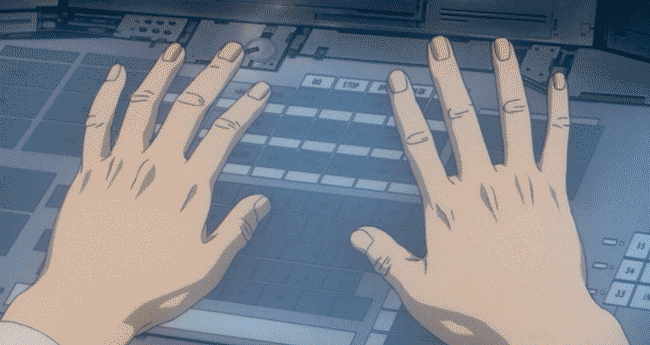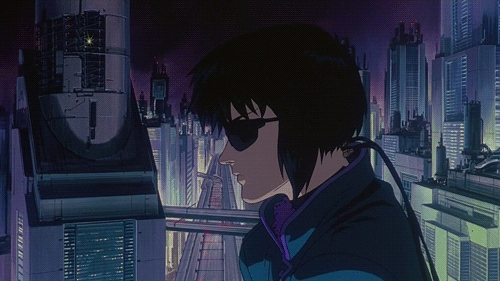 |
| Cover art from the movie featuring Motoko Kusanagi. |
"Artificial intelligence will reach human levels by around 2029. Follow that out further to, say, 2045, we will have multiplied the intelligence, the human biological machine intelligence of our civilization a billion-fold." ~Ray Kurzweil
The one that started it all. Ghost in the Shell has really made a name for itself in the last few decades. To this day, it continues to put out titles, its most recent anime being Ghost in the Shell: Arise. What led to the success of the franchise? Why is it still popular and relevant today despite coming out before many of you were born? Perhaps it's cyberpunk setting revolving around the definition of life and humanity can bring some answers to light.
SYNOPSIS
Set in the year 2029, humans are able to transfer their consciousness, called a "ghost," into a prosthetic body known as a "shell." Cyberized humans cling to their last morsel of humanity, their ghost, their soul, to define the line between what is man and what is a mere machine, a simple program consisting of lines and lines of code.
 |
| You can tell he's a desk jockey. |
REVIEW
"It can also be argued that DNA is nothing more than a program designed to preserve itself. Life has become more complex in the overwhelming sea of information. And life, when organized into species, relies upon genes to be its memory system. So, man is an individual only because of his intangible memory... and memory cannot be defined, but it defines mankind. The advent of computers, and the subsequent accumulation of incalculable data has given rise to a new system of memory and thought parallel to your own. Humanity has underestimated the consequences of computerization." ~The Puppet Master
It should be well known that Ghost in the Shell is a master of in-depth, philosophical themes which question the constitution of humanity. The very questions the anime poses dips into topics not relevant to today, but to tomorrow. What does it mean to be alive? Many installments of Ghost in the Shell tackle this issue by personifying computer systems, and this one is no exception. Masterfully executed, the movie presents its case by using rather inquisitive protagonists Motoko and Batou (her right hand man) as a medium to convey such concerns. With Motoko being completely cyberized, she wonders if her humanity is gone, even with the presence of her ghost, and when she lost it. These two hit off the topic frequently during the show's lower intensity points, making for interesting, straightforward dialogue sequences.
Ghost in the Shell also covers the idea of life rights. Should computers that do attain self-awareness be entitled to the same rights as humans? This question is closer to the root idea of the movie and a core component of the plot. When a certain artificial intelligence system is denied the right to political asylum, the action picks up exponentially as the conspiracy behind its origin is exposed. There are plenty of high intensity firefights to be found, but intervals of thought-provoking discussion are not in short supply.
 |
| Major Motoko Kusanagi wearing shades at night. |
The puppet master himself was rather weak for an antagonist. He serves the purpose of bringing themes presented throughout the movie to a complete fruition. While it's done remarkably well, the lack of depth into the antagonist "himself" creates a hollow feeling somewhere in the show. This gap is closed somewhat by the introduction of political enemies later in, but it left more to be desired from the one executing all these ghost hacking operations. Again, there is little to no exploration into these politicians, which detracts somewhat from the movie.
The soundtrack is one of the best in my opinion. One of the themes frequently heard is a dark interpretation on a chorale heard at marriages. It's a very beautiful song, with children singing in unison with orchestral sections bridging the two halves of the song. Look up "Making of Cyborg" by Kenji Kawai if you'd like to hear the whole thing.
 |
| View of a prosthetic body (shell). |
"There are countless ingredients that make up the human body and mind, like all the components that make up me as an individual with my own personality. Sure I have a face and voice to distinguish myself from others, but my thoughts and memories are unique only to me, and I carry a sense of my own destiny. Each of those things are just a small part of it. I collect information to use in my own way. All of that blends to create a mixture that forms me and gives rise to my conscience. I feel confined, only free to expand myself within boundaries." ~Motoko Kusanagi
OVERVIEW
It's not hard to see why Ghost in the Shell is so heavily praised. It serves as one of many testaments to the qualities that made anime so great. The series presents ideas you may not think about now, but perhaps later on when technology advances to a certain point, all while offering a solid, entertaining story with an appropriate amount of bullets and fist fights mixed in. The movie addresses the advancement of technology, the social and philosophical issues behind it, and the political mess created by it. Ghost in the Shell is one of the many major steps that made anime as popular as it is today (hopefully we can step back to those times).
Narrative: 8.00/10 (x2)
Characters: 8.40/10 (x2)
Aesthetics: 6.50/10 (x1)
Execution: 8.75/10 (x2)
Value: 8.70/10 (x3)
Composite: 8.29/10 (91.45% A-) "A classic that still holds relevancy."
No comments:
Post a Comment